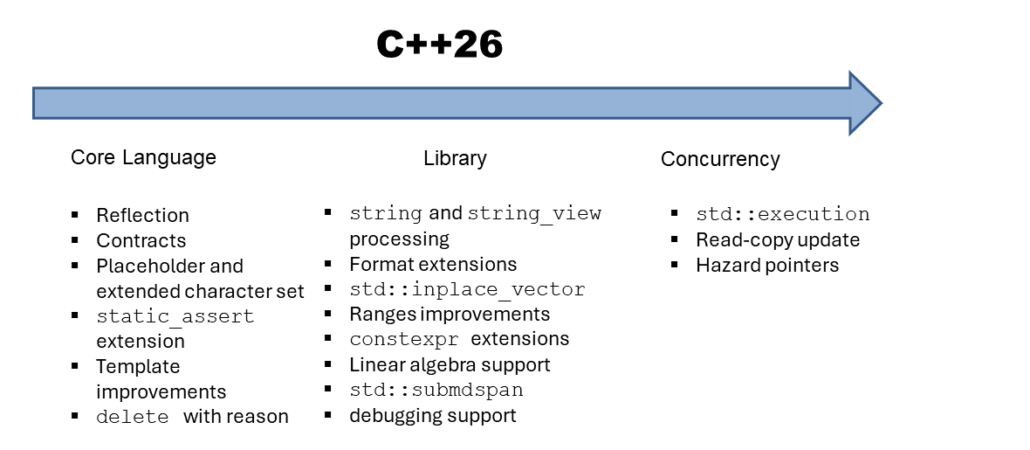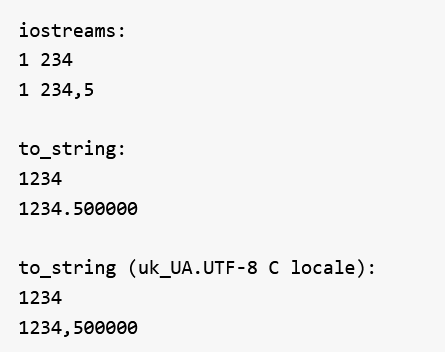An Overview of C++26: The Library
In my last post, I overviewed C++26’s core language. Today, I continue with the library.

To make it short. The library does not offer such powerful features as the core language. Let me name them and give you a short example directly from the proposal.
std::string and std::string_view Processing
The functions around std::string and std::string_view makes using them more convenient.
Testing for success or failure of <charconv> functions
Using the functions to_chars or from_chars was pretty inconvenient. You had to check with res.ec == std::errc{} the success of the conversion. With C++26, you can convert the result directly to bool.
Arithmetic overloads of std::to_string and use std::format
std::to_string has a few issues. The “choice of the floating-point format makes std::to_string of very limited use in practice” (P2587R3).
auto loc = std::locale("uk_UA.UTF-8"); std::locale::global(loc); std::cout.imbue(loc); setlocale(LC_ALL, "C"); std::cout << "iostreams:\n"; std::cout << 1234 << "\n"; std::cout << 1234.5 << "\n"; std::cout << "\nto_string:\n"; std::cout << std::to_string(1234) << "\n"; std::cout << std::to_string(1234.5) << "\n"; setlocale(LC_ALL, "uk_UA.UTF-8"); std::cout << "\nto_string (uk_UA.UTF-8 C locale):\n"; std::cout << std::to_string(1234) << "\n"; std::cout << std::to_string(1234.5) << "\n";

The program shows that the output of floating point overloads is inconsistent for iostreams. It takes the decimal point from the global C locale.
Interfacing stringstreams with std::string_view
Thanks to proposal P2495R3, you can create a stringstream from a std::string_view. In the following example, ""sv is an empty string_view literal.
// implicitly convertable to string_view const mystring str; stringstream s1(""sv); stringstream s1(str); s2.str(""sv);
Concatenation of strings and string views
With C++26, you can concatenate strings and string viewsString-Views:
std::string calculate(std::string_view prefix) { return prefix + get_string(); // NO ERROR }
Format Extensions
Pointers
Before C++26, only void, const void, and std::nullptr_t pointer types are valid. If you want to display the address of an arbitrary pointer, you must cast it to (const) void*.
double d = 123.456789; std::format("{}", &d); // ERROR std::format("{}", static_cast<void*>(&d)); // okay std::format("{}", static_cast<const void*>(&d)); // okay std::format("{}", nullptr); // okay
With C++26, the error messages disappear.
// pointerFormat.cpp #include <format> #include <iostream> int main() { std::cout << '\n'; double d = 123.456789; std::cout << std::format("{}", static_cast<void*>(&d)) << '\n'; std::cout << std::format("{}", static_cast<const void*>(&d)) << '\n'; std::cout << std::format("{}", nullptr) << '\n'; std::cout << '\n'; }
Here’s the output of the program.

std::filesystem::path
std::format can display std::filesystem::path objects. The example from the proposal P2845R8 shows.
auto p1 = std::filesystem::path("/usr/bin");
Ja std::cout << std::format("{}", p1); // /usr/bin
auto p2 = std::filesystem::path("multi\nline");
std::cout << std::format("{}", p2); // multi
// line
auto p3 = std::filesystem::path("multi\nline");
std::cout << std::format("{:?}", p3); // "multi\nline"
Thanks to the format string “{:?}” in the last line, the escape sequence “\n” is not interpreted.
std::inplace_vector
std::inplace_vector “is, a dynamically-resizable vector with compile-time fixed capacity and contiguous embedded storage in which the elements are stored within the vector object itself.” (P0843R8)
This container can be used as a drop-in replacement for std::vector. You might ask yourself, when should I use the inplace _vector or vector.
 Modernes C++ Mentoring
Modernes C++ Mentoring
Do you want to stay informed: Subscribe.
The proposal P0843R8 gives you the answer:
- memory allocation is not possible, e.g., embedded environments without a free store, where only a stack and the static memory segment are available,
- memory allocation imposes an unacceptable performance penalty, e.g., with respect to latency,
- allocation of objects with complex lifetimes in the static-memory segment is required,
std::arrayis not an option, e.g., if non-default constructible objects must be stored,- a dynamically-resizable array is required within
constexprfunctions, - the storage location of the
inplace_vectorelements is required to be within theinplace_vectorobject itself (e.g. to supportmemcpyfor serialization purposes).
Ranges Improvements
The ranges library will get new functions: std::ranges::generate_random and std::ranges::concat_view.
The call std::ranges::generate_random(fltArray, g, d) uses the generator g and the distribution d to create the random numbers. The call is equivalent to the following loop:
for(auto& el : fltArray) el = d(e);
constexpr Extensions
Since C++11, the tendency has continued: More and more become constexpr in C++.
- The algorithm
std::stable sort, std::stable partition, andstd::inplace_mergeareconstexprin C++26. This is alsotruefor their counterparts in the ranges library. - The proposal P1383R2 “amounts to a (further) liberal sprinkling of constexpr in <cmath> , together with a smattering in <complex>“.
What’s next?
In my next post, I will continue my journey through the library in C++26l
Thanks a lot to my Patreon Supporters: Matt Braun, Roman Postanciuc, Tobias Zindl, G Prvulovic, Reinhold Dröge, Abernitzke, Frank Grimm, Sakib, Broeserl, António Pina, Sergey Agafyin, Андрей Бурмистров, Jake, GS, Lawton Shoemake, Jozo Leko, John Breland, Venkat Nandam, Jose Francisco, Douglas Tinkham, Kuchlong Kuchlong, Robert Blanch, Truels Wissneth, Mario Luoni, Friedrich Huber, lennonli, Pramod Tikare Muralidhara, Peter Ware, Daniel Hufschläger, Alessandro Pezzato, Bob Perry, Satish Vangipuram, Andi Ireland, Richard Ohnemus, Michael Dunsky, Leo Goodstadt, John Wiederhirn, Yacob Cohen-Arazi, Florian Tischler, Robin Furness, Michael Young, Holger Detering, Bernd Mühlhaus, Stephen Kelley, Kyle Dean, Tusar Palauri, Juan Dent, George Liao, Daniel Ceperley, Jon T Hess, Stephen Totten, Wolfgang Fütterer, Matthias Grün, Phillip Diekmann, Ben Atakora, Ann Shatoff, Rob North, Bhavith C Achar, Marco Parri Empoli, Philipp Lenk, Charles-Jianye Chen, Keith Jeffery, Matt Godbolt, Honey Sukesan, bruce_lee_wayne, Silviu Ardelean, schnapper79, Seeker, and Sundareswaran Senthilvel.
Thanks, in particular, to Jon Hess, Lakshman, Christian Wittenhorst, Sherhy Pyton, Dendi Suhubdy, Sudhakar Belagurusamy, Richard Sargeant, Rusty Fleming, John Nebel, Mipko, Alicja Kaminska, Slavko Radman, and David Poole.
| My special thanks to Embarcadero |  |
| My special thanks to PVS-Studio |  |
| My special thanks to Tipi.build |  |
| My special thanks to Take Up Code |  |
| My special thanks to SHAVEDYAKS |  |
Modernes C++ GmbH
Modernes C++ Mentoring (English)
Rainer Grimm
Yalovastraße 20
72108 Rottenburg
Mail: schulung@ModernesCpp.de
Mentoring: www.ModernesCpp.org




